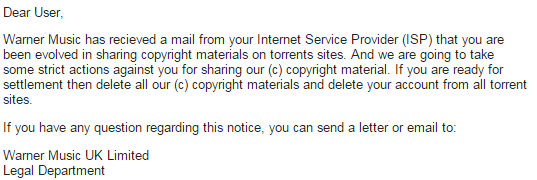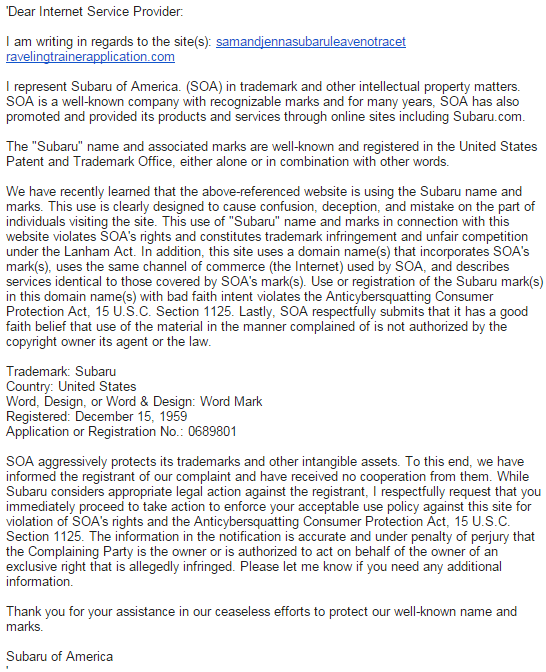Fake Warner Music Threat Stops Torrent Uploaders
jeudi 10 septembre 2015 à 17:52 All popular torrent sites heavily rely on uploaders. These people have a crucial spot in the ecosystem and without them torrent sites would have no content to share.
All popular torrent sites heavily rely on uploaders. These people have a crucial spot in the ecosystem and without them torrent sites would have no content to share.
In recent weeks several prominent music uploaders appeared to have become the target of a legal campaign launched by the UK branch of Warner Music. In an email signed by the record label they were threatened to comply with the company’s demands, or face legal action instead.
TF has received a full copy of the message which was sent to email addresses associated with the uploaders’ torrent site accounts. In it, Warner Music urges them to delete all their torrents and terminate their accounts.
The email in question targets prolific uploaders at ExtraTorrent and KickassTorrents, among other sites. It claims to be sent from an official Warner Music email address, but this is not the case.

First of all, the email contains several spelling and grammar mistakes and is clearly not sent by a native English speaker. In addition, it claims that ISPs reported the uploader, while it’s generally known that Internet providers don’t track file-sharers or reveal customer details without a court order.
The biggest tell, however, is revealed when looking at the full email headers. These show that the Warner Music email is spoofed. In reality, it was sent by amonymousemail.me, as shown below.

Despite these tells, the email was spooky enough for several uploaders to throw in the towel. One uploader now lists on his profile that he’s “retired” and others have stopped releasing new content as well.
“Some of them vanished and stopped uploading,” ExtraTorrent’s Sam confirms to TF, adding that other uploaders continued their work after they spotted that the email was fake.
TF spoke to several uploaders and other people in the know and no one has a clue as to what motivated the sender.
What’s perhaps most worrying, is how this person got his hands on the uploader’s email addresses. Some hint at a security breach, but social engineering is a viable option as well.
Just a few weeks ago KickassTorrents warned its users against phishing attempts, in which malicious parties attempt to obtain the personal details of users.
Today the KAT team informs TF that they have high security standards and that none of the staff members has any idea how this may have happened.
“We are quite shocked as we have a tight community and only trustworthy people with whom we maintain close communication have the access to the user email info,” they say.
For now it remains unknown what happened in this case, but for uploaders the whole ordeal is a reminder that privacy is often hard to find. For their part, copyright holders may be pleasantly surprised to see how easy it is to stop some people from sharing pirated material.
A full copy of the Warner Music email is published below.
—
Dear User,
Warner Music has recieved a mail from your Internet Service Provider (ISP) that you are been evolved in sharing copyright materials on torrents sites. And we are going to take some strict actions against you for sharing our (c) copyright material. If you are ready for settlement then delete all our (c) copyright materials and delete your account from all torrent sites.
If you have any question regarding this notice, you can send a letter or email to:
Warner Music UK Limited
Legal Department
The Warner Building
Warner Music UK Limited, The Warner Building
27 Wrights Lane
London
W8 5SW
Sincerely,
Warner Music UK Limited
Ignoring the email would result in legal actions.
Source: TorrentFreak, for the latest info on copyright, file-sharing, torrent sites and ANONYMOUS VPN services.
 Early September the Oslo District Court followed in the footsteps of other courts around Europe by
Early September the Oslo District Court followed in the footsteps of other courts around Europe by  This Saturday, Floyd Mayweather will conclude his professional fighting career with a match against Andre Berto.
This Saturday, Floyd Mayweather will conclude his professional fighting career with a match against Andre Berto. 
 In March 2014, TorrentFreak interviewed an Argentinian designer known only as Sebastian. He had coordinated a project which would to some degree change the piracy landscape with a new piece of software called Popcorn Time.
In March 2014, TorrentFreak interviewed an Argentinian designer known only as Sebastian. He had coordinated a project which would to some degree change the piracy landscape with a new piece of software called Popcorn Time. Automattic, the company behind the popular WordPress blogging platform, receives thousands of takedown requests from rightsholders.
Automattic, the company behind the popular WordPress blogging platform, receives thousands of takedown requests from rightsholders. 